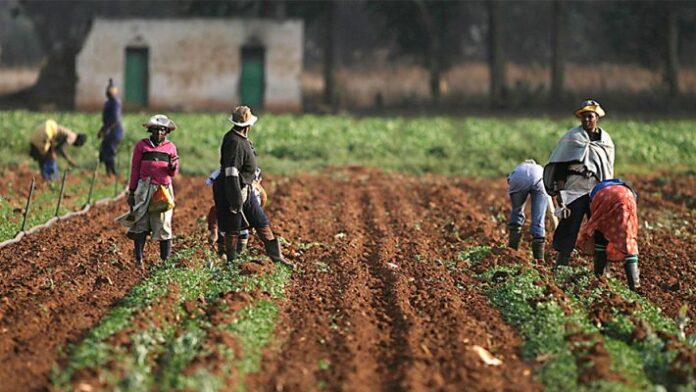By Jeph Ajobaju, Chief Copy Editor
Nigeria currently cultivates 88,950 hectares of land for irrigation, representing only 0.028 per cent of total 3.14 million hectares available for irrigated farming, leaving arid land for seasonal rainfall to produce crops to feed a population of 200 million.
Food import bill was more than $5 billion in 2020, with more than $1.5 billion spent on importing milk and dairy products only, according to the Ministry of Agriculture and Rural Development (MARD).
India with six times bigger population does not import food.
The MARD and the Ministry of Water Resources both cited efforts to expand irrigation across the country, but farmers and agricultural experts condemned the poor irrigation system, per The PUNCH.
They told the newspaper that the spike in food prices is worsened by the lack of irrigated farmlands in many states.
Document from the Agriculture and Water Ministries in Abuja showed that while only 88,950 Ha were irrigated as of 2020, irrigation annual water demand is about 1.926 billion cubic metres (bcm)
“Nigeria’s irrigation potential is about 3.14 million Ha (hectares) out of which only 88,950 Ha have been developed as of 2020.
“Irrigation annual water demand is about 1.926 BCM comprising of irrigation in wet and dry seasons as well as Fadama lands,” the document stated quoted by The PUNCH.
Officials of both ministries said a National Irrigation Development Programme was initiated in 2016 to support THE government’s drive towards diversifying the economy to ensure food security and create jobs.
The government had aimed to establish additional 100,000 Ha of irrigated farmland by 2020 and 500,000 Ha by 2030.
“The programme also has a target of creating an additional 1,000,000 hectares of irrigatable land to be developed by the private sector and state governments by 2030,” said an official, who requested not to be named for lack of authorization.
Farmers, experts criticise scheme
Farmers and experts in agriculture decried the meagre 88,950 Ha irrigated, stressing that this contributes to the food crisis in the country.
Emmanuel Ijewere, the Coordinator of Nigeria Agribusiness Group (NAG), a body of industry experts and operators, told The PUNCH that Nigerian farmers do not farm all year round due to a lack of irrigation.
“Irrigation is absolutely necessary for Nigeria so that we can produce food all year round, rather than relying almost exclusively on the weather,” he said.
Ijewere insisted that the 89,000 Ha irrigated “is nothing. That is, I am saying that what is the scientific approach? How much do we need and where do we need it? And for who?
“There should be transparency. If they had made a general statement that the target was to irrigate 100,000 hectares of land in 2020, it means it was included in the budget and money was made available for it.”
He reiterated that food producers are struggling due to a lack of irrigatable land and the government should provide the facility for farmers.
Ijewere added: “Irrigation helps to boost food production. But the government has to request that those who own farmlands and want their farms to be irrigated should apply.
“Government will then subsidise the irrigation but it will be owned by the farm and the farm will use it for what it is meant for.
“It is a good thing that the government is trying to develop irrigation projects. But the past experience we have seen and heard is that it is never good for government to start participating in a private sector driven area.
“In the first place, when they say they are going to do it for 100,000 hectares or more, who are the owners of the farms? Government does not own farms; so, how do they choose the owners of the farms?
“What is the technical advice that we got that will be in the best interest of the country so that when tax payers’ money is spent, it will be sustainable and maintained.
“So the irrigation projects of government need to be more transparent. Their intention is good but the application is dangerous, not sustainable and extremely wasteful.”
Nigeria Cassava Growers Association President, Segun Adewumi, said less than 2 per cent of irrigatable farmlands are actually irrigated.
“If we have a good irrigation system we will not have to depend on or wait for the rainy season before we plant.
“Let us take, for instance, in terms of percentage; if the normal requirement for irrigation in Nigeria is, say, 100 per cent, I don’t think we have up to two per cent,” Adewumi stressed.
He said this will hamper food production as most farmers rely on the rainy season to start planting.
All Farmers Association of Nigeria (AFAN) National President, Kabir Ibrahim, told The PUNCH that farmers rely mainly on rainfall for crop production because the irrigation system is non-functional.
“The irrigation system in Nigeria is near non-functional, otherwise, why would farmers depend majorly on rainfall for crop production?” he asked.
Completed schemes
The document showed that seven irrigation schemes were completed between 2016 and 2020, bringing actual area under irrigation to 88,950 Ha.
The schemes include
· Mamu Awka Drainage and Land Reclamation, Anambra State (180 Ha)
· Azare-Jere Irrigation Project, Kaduna State (1,500 Ha)
· Sabke Irrigation Project, Katsina State (1,200 Ha).
· Gari Irrigation Project (248 Ha)
· Shagari Irrigation Project, Sokoto State (220 Ha)
· Middle Rima Valley Irrigation Project (2,746.08 Ha)
During the five-year period, according to the document, 55,000 Ha of irrigation land were leased out to commercial farmers under a Public Private Partnership (PPP) scheme.
The feasibility studies and designs of some completed projects include Integrated Irrigation Development, Nasarawa Sate (6,600 Ha) and Donga Suntai Project (6,000 Ha).
The document said the government
· Is carrying out the Transforming Irrigation Management in Nigeria Project, which is supported by the World Bank.
· Seeks to improve irrigation management and reduce rural poverty through progressive management transfer to user-regulated bodies such as Water User Associations.
The programme comprises rehabilitation/expansion of about 42,000 Ha of irrigation land in the first phase expected to be completed by 2022.
“The project is a loan facility of $495.3 million from the World Bank, counterpart funding of $44 million from the federal government and beneficiary contribution is $21m,” the document said.
The total cost of the project is $560.3 million. The projects include
· Bakalori Irrigation Project (13,500 Ha) where work began in 2017.
· Kano River Irrigation Project (14,400 Ha). The contractor began mobilisation in early 2019.
· Hadejia Valley Irrigation Project (6,000 Ha). The construction began in May 2018.













